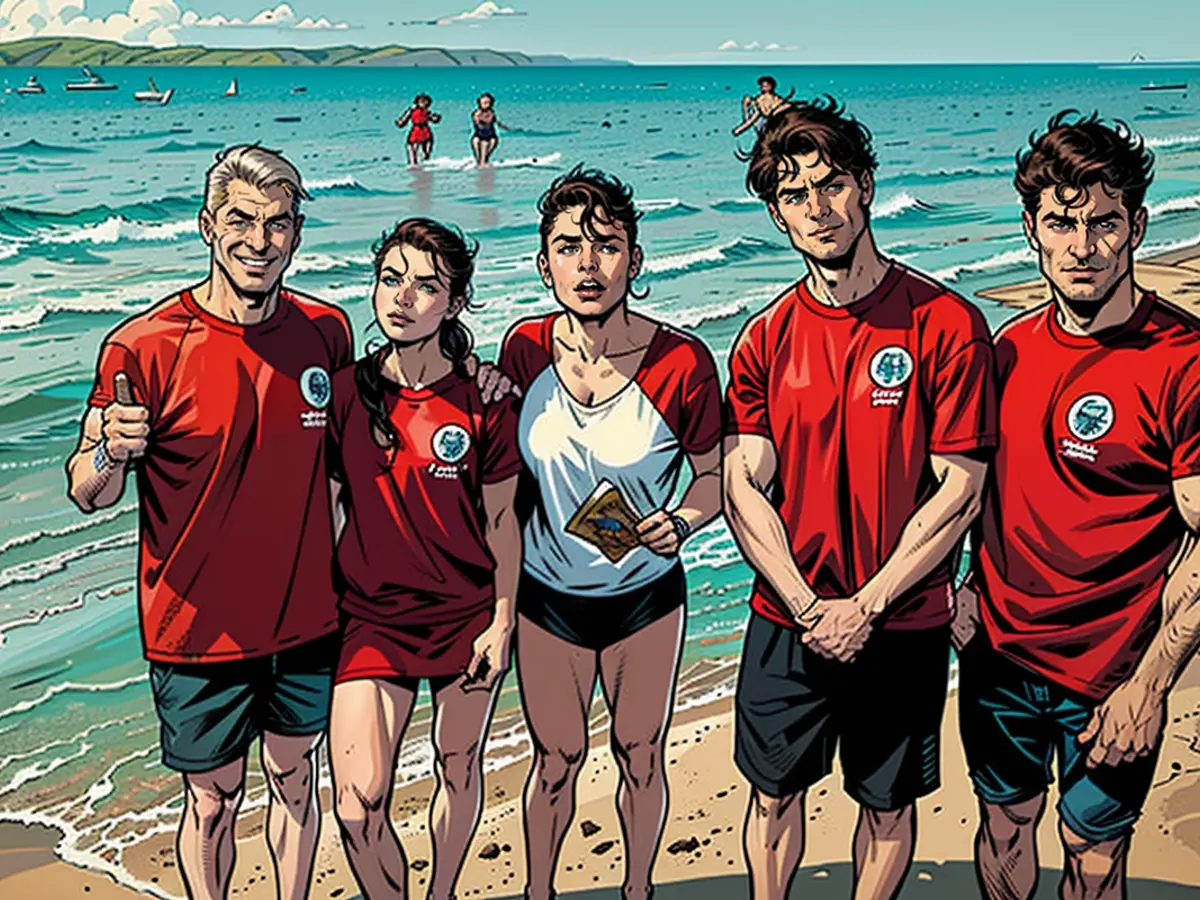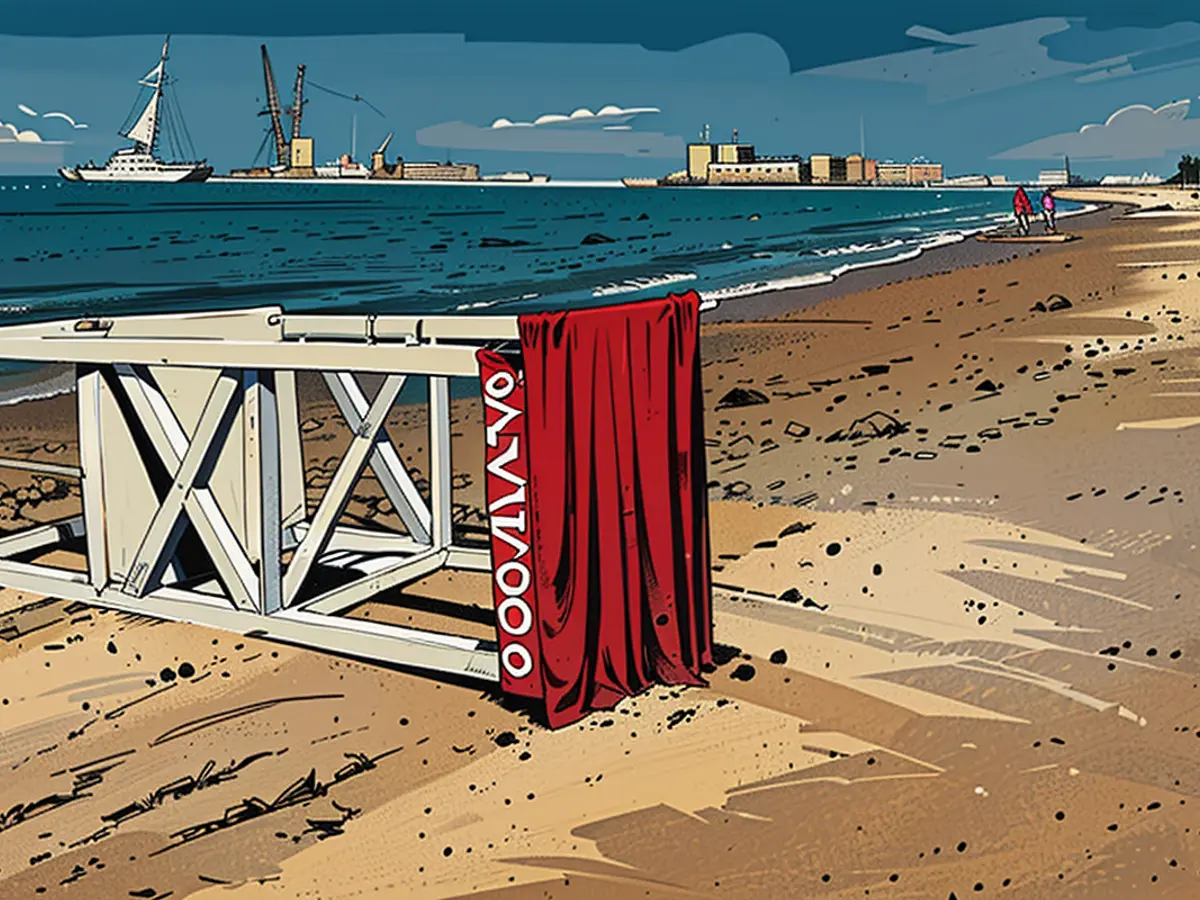The heroes of summer are dying out
In Italy, there's a lack of lifeguards. The tan men in red tank tops, often attractive and with a whistle in their mouths, have been heroes of every summer for generations. The lifeguard, the Italian original, was celebrated in cinema, went into literature. Now, however, few want to be a lifeguard. This mythological figure may be on the verge of extinction.
Everywhere, personnel is missing. The operators of about 15,000 beach establishments across the country are complaining bitterly that the youth is dwindling. A few weeks ago, the shortage was officially estimated at around 4,000 positions. Now, as the main season begins, the situation has improved somewhat. However, according to consistent reports from employers and unions, approximately ten percent of the beaches still haven't found personnel.
Strand operators complain
Fabrizio Licordari, the head of the Strandbetriebe-Verband Assobalneari, says: "Times have changed. When we were young, we stood in line to become lifeguards and earn a little money in the summer. Today, it's difficult for young people to approach the job." This is due to various reasons. In general, the offer of summer jobs in Italy's holiday regions exceeds the demand by several factors: other seasonal workers such as waiters, chefs, and chambermaids are also hard to find.
The search for lifeguards is, however, even more complicated. As of April 1, a regulation came into force in Rome, raising the minimum age from 16 to 18 years. At least 30 hours of training are required, divided into theory ("Basic concepts of environmental and nature protection at bathing waters") and practice. The cost of such a training course is approximately 500 Euros. At the end, there's an exam presided over by a civil servant from the respective harbor office. The license must be renewed every five years.
Advertising brings little success
The operators of the approximately 15,000 beaches in Italy are complaining bitterly about the lack of personnel. The tan men in red tank tops, often attractive and with a whistle in their mouths, have been heroes of every summer for generations. The lifeguard, the Italian original, was celebrated in cinema, went into literature. Now, however, few want to be a lifeguard. This mythological figure may be on the verge of extinction.
Everywhere, personnel is missing. The operators of the approximately 15,000 beach establishments across the country are complaining bitterly that the youth is dwindling. A few weeks ago, the shortage was officially estimated at around 4,000 positions. Now, as the main season begins, the situation has improved somewhat. However, according to consistent reports from employers and unions, approximately ten percent of the beaches still haven't found personnel.
The Chef of the Strandbetriebe-Verband Assobalneari, Fabrizio Licordari, states: "The times have changed. When we were young, we stood in line to become lifeguards and earn a little money in the summer. Today, it's difficult for young people to approach the job." This is due to various reasons. In general, the offer of summer jobs in Italy's holiday regions exceeds the demand by several factors: other seasonal workers such as waiters, chefs, and chambermaids are also hard to find.
The search for lifeguards is, however, even more complicated. As of April 1, a regulation came into force in Rome, raising the minimum age from 16 to 18 years. At least 30 hours of training are required, divided into theory ("Basic concepts of environmental and nature protection at bathing waters") and practice. The cost of such a training course is approximately 500 Euros. At the end, there's an exam presided over by a civil servant from the respective harbor office. The license must be renewed every five years.
Despite intensive advertising campaigns, the number of applicants remains low. The image of the lifeguard as a hero has faded, and the requirements for the job are perceived as too high. The beach operators are therefore calling for a simplification of the training and a reduction in the cost of the course. They also want to lower the minimum age again. The debate is ongoing.
A few years ago, Mastromauro had around three dozen trainee lifeguards at the beach in Barletta. Now there are only six young men and one woman. This isn't just due to Italy's very low birth rate in Europe. He says, "One must get up early, endure the heat, and take responsibility." Nowadays, young people prefer to do something else, especially in front of a computer.
Advertising efforts through social networks, schools, or upper classes have had little effect.
Moreover, the hourly wage is not particularly high. At the Barletta beach, there is an hourly wage of six Euros, with a shift from 8:00 am to 6:00 pm, and a midday hour-long break. This is the reason why, between 1:00 pm and 2:00 pm, the red flag often flies on Italian beaches, regardless of weather conditions and sea conditions.
Hourly wage of 4.50 Euro
Officially, the national labor contract for lifeguards in the tourist industry has a net salary of 1200 Euro, which varies depending on the classification. However, trade unions in a recent Adnkronos survey reported that many are often paid below the tariff, with hourly wages as low as 4.50 Euro. Meanwhile, beach attendants make good money from renting sun umbrellas and beach chairs, which is common in Italy. Some demand 60 Euros and more per day.
Despite this, there are still people who want to be lifeguards. Like Andrea Ripretti from a neighboring town of Barletta, whom Mastromauro is currently teaching the handling of the rescue boat. "I find it more fun than messing around on the computer," says the 20-year-old, who has just finished school. "You meet many people and do something meaningful. I feel useful." His teacher stands by smiling. Then he pats Andrea approvingly on the shoulder.
In light of the tourism industry's skills shortage, the minimum wage for lifeguards in Italy was increased, requiring at least 30 hours of training and a 500 Euro course fee. Due to these factors, advertising efforts to fill the 4,000 vacant lifeguard positions have been largely unsuccessful internationally.
To address this issue, various stakeholders, including the beach operators and unions, are advocating for a simplification of the training program and a reduction in the cost of the course, as well as lowering the minimum age requirement again. These changes could potentially attract more young people to the lifeguarding profession and help alleviate the shortage.







